
Victor Andrew de Bier Everleigh McLaglen was a British-American actor and boxer. His film career spanned from the early 1920’s through the 1950’s, initially as a leading man, though he was better known for his character acting. He was a well-known member of John Ford’s Stock Company, appearing in 12 of the director’s films, seven of which co-starred John Wayne.
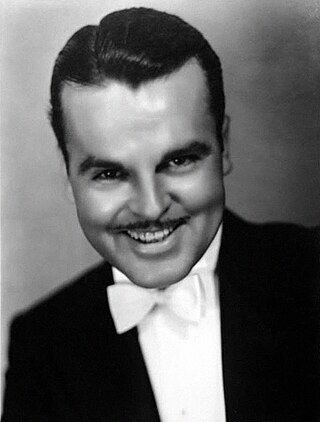
James Neil Hamilton was an American stage, film and television actor, best remembered for his role as Commissioner Gordon on the Batman TV series of the 1960s, having first played a character by that name in 1928's Three Weekends. During his motion picture career, which spanned more than a half century, Hamilton performed in over 260 productions in the silent and sound eras.

Noah Nicholas Beery was an American actor who appeared in films from 1913 until his death in 1946. He was the older brother of Academy Award-winning actor Wallace Beery as well as the father of prominent character actor Noah Beery Jr. He was billed as either Noah Beery or Noah Beery Sr. depending upon the film.
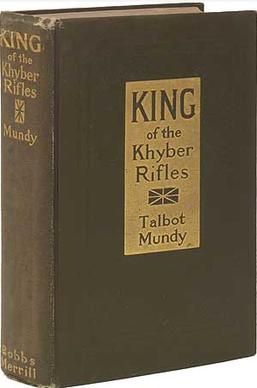
King of the Khyber Rifles is a novel by British writer Talbot Mundy. Captain Athelstan King is a secret agent for the British Raj at the beginning of the First World War. Heavily influenced both by Mundy's own unsuccessful career in India and by his interest in theosophy, it describes King's adventures among the tribes of the north with the mystical woman adventuress, princess Yasmini and the Turkish mullah Muhammed Anim. Like Greenmantle by John Buchan, also first published in 1916, it deals with the possibility that Turkey might try to stir Muslims into a jihad against the British Empire.
Andrew Victor McLaglen was a British-born American film and television director, known for Westerns and adventure films, often starring John Wayne or James Stewart.
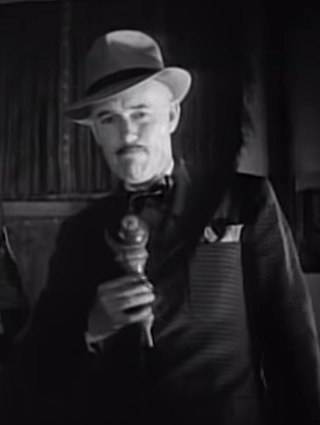
Charles D. Brown was an American stage and film actor.

She Wore a Yellow Ribbon is a 1949 American Technicolor Western film directed by John Ford and starring John Wayne. It is the second film in Ford's "Cavalry Trilogy", along with Fort Apache (1948) and Rio Grande (1950). With a budget of $1.6 million, the film was one of the most expensive Westerns made up to that time. It was a major hit for RKO. The film is named after "She Wore a Yellow Ribbon", a song popular with the US military.
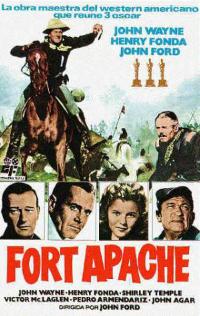
Fort Apache is a 1948 American Western film directed by John Ford and starring John Wayne and Henry Fonda. The film was the first of the director's "Cavalry Trilogy" and was followed by She Wore a Yellow Ribbon (1949) and Rio Grande (1950), both also starring Wayne. The screenplay was inspired by James Warner Bellah's short story "Massacre" (1947). The historical sources for "Massacre" have been attributed both to George Armstrong Custer and the Battle of Little Bighorn and to the Fetterman Fight.
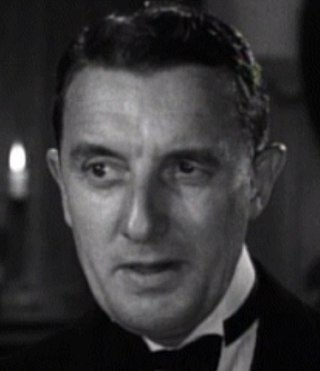
Henry Victor was an English-born character actor who had his highest profile in the film silent era, he appeared in numerous film roles in his native Britain, before emigrating to the United States in 1939 where he continued his career, working in Hollywood films

Renegades is a 1930 American pre-Code film directed by Victor Fleming for Fox Film. It stars Warner Baxter, Myrna Loy, and Noah Beery. Jules Furthman based his script on André Armandy's novel Le Renégat. Fleming shot in the Mojave Desert where the extreme heat proved a severe impediment to the production. Bela Lugosi has a relatively small role as the Marabout, a Rif sheik whom Loy's character manipulates, but his character is important to the story. An uncredited Victor Jory in his film debut plays a Legion officer. Critics mostly acclaimed the film as "a great action picture" and "a box office hit" that had to be held over.

Annie Laurie is a 1927 American silent romantic drama film directed by John S. Robertson, released by Metro-Goldwyn-Mayer, and starring Lillian Gish and Norman Kerry. It is about the battles of Scottish clans.

Men in White is a 1934 pre-Code film starring Clark Gable and Myrna Loy, and directed by Ryszard Bolesławski. The story is loosely based on the Sidney Kingsley Pulitzer-Prize-winning play of the same name. Due to suggestions of illicit romance and abortion, the film was frequently cut. The Legion of Decency declared the movie unfit for public exhibition.
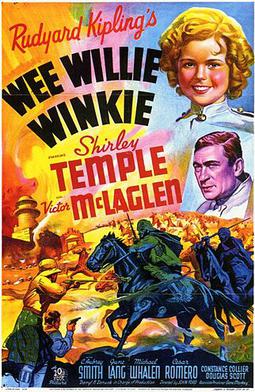
Wee Willie Winkie is a 1937 American adventure drama film directed by John Ford and starring Shirley Temple, Victor McLaglen, and Cesar Romero. The screenplay by Julien Josephson and Ernest Pascal was based on a story by Rudyard Kipling. The film's story concerns the British presence in 19th-century India. The production was filmed largely at the Iverson Movie Ranch in Chatsworth, California, where a number of elaborate sets were built for the film. This film was the first of three in which Shirley Temple and Cesar Romero appeared together, second was Ali Baba Goes to Town (1937) and The Little Princess (1939).

Gregory Gaye was a Russian-American character actor. The son of an actor, he was born in St. Petersburg, Russia. He was the uncle of actor George Gaynes.

The Princess and the Pirate is a 1944 American comedy film directed by David Butler and starring Bob Hope and Virginia Mayo. Based on a story by Sy Bartlett, the film is about a princess who travels incognito to elope with her true love instead of marrying the man to whom she is betrothed. On the high seas, her ship is attacked by pirates who plan to kidnap her and hold her for ransom, unaware that she will be rescued by the unlikeliest of knights errant. Produced by Samuel Goldwyn, The Princess and the Pirate received Academy Award nominations for Best Art Direction and Best Music Score.

Strong Boy is a 1929 American sound comedy film directed by John Ford. While the film has no audible dialog, it was released with a synchronized musical score with sound effects using the sound-on-film Movietone process. The film, which was Ford's last silent film, is now considered to be lost. A trailer for the film was discovered in the New Zealand Film Archive in 2010 and subsequently preserved by the Academy Film Archive the same year.

David Torrence was a Scottish film actor. He appeared in more than 100 films from 1913 to 1939. He has a star on the Hollywood Walk of Fame. He was the brother of actor Ernest Torrence. He was born in Edinburgh, Scotland and died in Los Angeles.
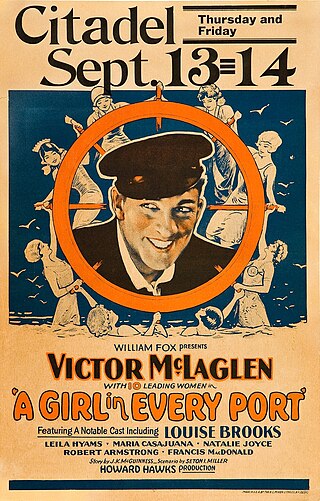
A Girl in Every Port is a 1928 American silent comedy film based on an original story by Howard Hawks, who directed the film as well. The feature stars Victor McLaglen, Robert Armstrong, and Louise Brooks. It was produced and distributed by the Fox Film Corporation, which later remade it as Goldie in 1931, with Spencer Tracy and Jean Harlow. A print of the 1928 movie exists at the George Eastman House and a DVD-R was released in 2002.
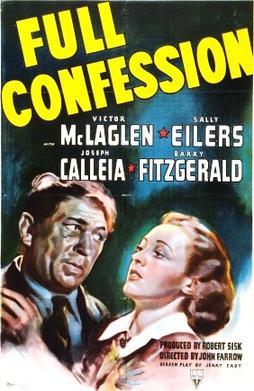
Full Confession is a 1939 is a US proto film-noir, crime drama film made by RKO Radio Pictures. It was directed by John Farrow from an adaptation by Jerome Cady of Leo Birinski's story. The film stars Victor McLaglen, Sally Eilers, Barry Fitzgerald and Joseph Calleia.

Gun the Man Down is a 1956 American western film directed by Andrew V. McLaglen and starring James Arness and Angie Dickinson in her first leading role. The film was produced by Robert E. Morrison for his brother John Wayne's company Batjac Productions. It was the second theatrical feature directed by McLaglen, who was a prolific director of television westerns.




















